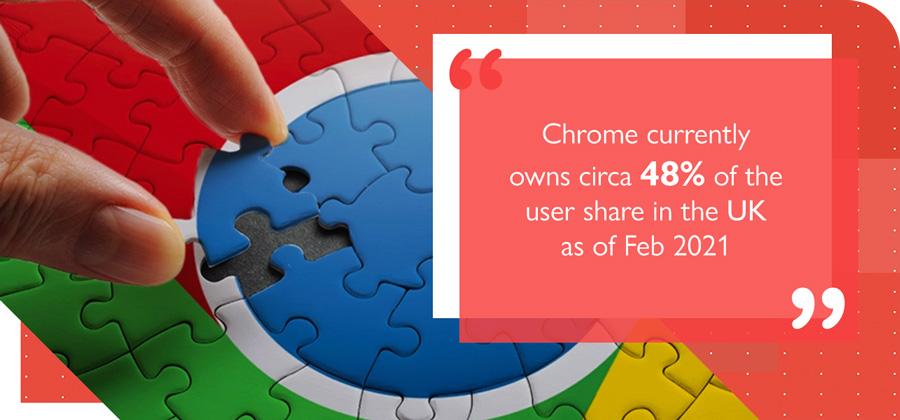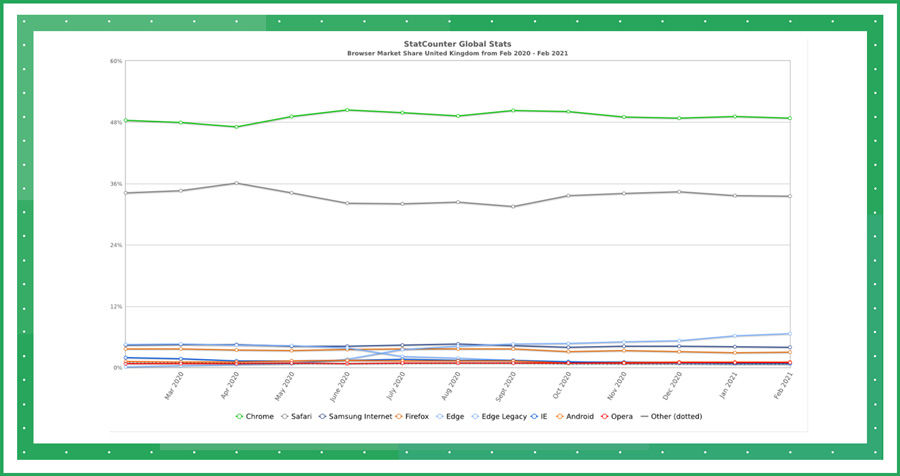Google is currently in a testing phase for a replacement to third party cookies. FLoC stands for Federated Learning of Cohorts, and it is Google’s potential answer for increasing privacy concerns around third party cookies.
Summary
- This is only in testing phase
- This relies on the browsers to enable interest-based advertising:
- This means FLoC is likely to only be on Chrome
- The reliance on the browser for FLoC to work, means users have to be happy with it, not just advertisers.
- This could have a huge effect on PPC advertisers (or no effect at all)
What is FLoC?
Federated Learning of Cohorts (FLoC) is the potential replacement for the third party cookies that drive a large portion of the online advertising that we do in PPC. In a nutshell, instead of taking and using the data of one individual it is group users into similar interests into cohorts (you see the connection).
This will work on its own algorithm to do this, so it will likely evolve over time. This algorithm will look at the browsing of the user and store it locally on the browser, which will then be used to create a cohort ID. The cohort ID is then grouped together with thousands of other users’ cohort IDs, which would make it extremely difficult to disseminate a user from.
As the IDs are grouped by similar interest however, they should still provide enough information to target with advertising (advertising is dead, long live advertising).
You can read deeper into exactly what FLoC is on the proposal on Github.

How does FLoC work vs Third Party Cookies?
FLoC’s main goal is to increase user privacy and anonymity when surfing the web. This is a major flaw with third party cookie data as it is purely based on the individual.
The theory is that by creating unique IDs that are grouped with a high number of other IDs, it will solve this issue. Further to this, users will be assigned into new cohorts periodically. This is primarily to keep browsing interest accurate, but it does add another layer of security.
Issues and challenges around FLoC
There are three key challenges of FLoC.
- Satisfying users’ privacy concerns
- Satisfying advertiser’s targeting requirements and margins
- Browser compatibility
Satisfying Users
The issue with point one is that users have a growing appetite from privacy, and this may not be a big enough step to satiate them. Whilst this adds a layer of anonymity, in theory, a sophisticated and motivated party could still extract user data from this. It isn’t 100% guaranteed to protect users.
In the proposal on Github, it is highlighted that there is concerns around the ability for websites to record user data when they sign in using their email address and reveal their cohort. This is the biggest issue that Google has made a statement around a clustering algorithm designed to prevent this. This will be something that will be monitored and heavily scrutinized before FLoC is launched to the public.
Satisfying Advertisers
Then there is advertisers, which is us and our clients. Our main concern here is accuracy of the cohorts interest when compared with third party cookies – there is simply no way that this can compete with relevant individual data, however Google is claiming “advertisers can expect to see at least 95% of the conversions per dollar spent when compared to cookie-based advertising”.
95% is still a big increase in cost per sale/ lead, especially for some of our accounts that spending large sums of money every day on advertising! Ultimately, this will come down to testing on our part. We know that it is a level playing field, so all advertisers may feel the squeeze of this and it may create less competition as advertisers reduce spend, or it may have a minimal effect and change nothing. Only time will tell.

Browser compatibility
Browser compatibility is another thing, as this can only be rolled out on Google Chrome as it is owned and operated by Google. Safari and Firefox have already ceased to use third party cookies, which has reduced the impact of this from Google’s perspective.
Chrome currently owns circa 48% of the user share in the UK as of Feb 2021:

It will be interesting to see if, in the event FLoC is a success, we see Safari and Firefox follow suit with their own cohort system.
For now, and some time it may seem, Google’s advertising platform will only be able to reach just over half of the market in the UK, and similar in many developed countries where ad spend is largest with their platform.
When could the changes be made?
The short answer is, we don’t know. Google have been testing this for a while, and will be testing this with advertisers starting next month (Q2, 2021). They initially said last year that they would aim to move away from third party cookies in Chrome by the end of 2021, but that is not looking likely.
Our best guess is that this will be rolled out (assuming testing is successful) in 2022.

What should businesses do to prepare?
There are two things you can do to help you prepare for the future. There will inevitably be a world with no third party cookies soon, it is a case of when not if.
Keep an eye on latest news:
As we move forward in 2021, more testing will be done with advertisers, which is the real acid test. At the end of the day, money talks, and if it looks like advertisers are going to take a big hit to their ROI and jump ship, this will be delayed.
Prioritise first party data:
Whilst we generally make an effort to collect data from our audience as businesses – it is a very good time to double down on this. Create a strategy that works harder to build an email list by providing more value up front. If you are not sure where to start with this, get in touch and we can help you.
Start tracking everything properly on your website! So many businesses have thousands of users visit their website every week/ month, but have no idea what the user is doing on-site.
The more data you have for your customers/ audience, the less reliant you are on third party data. This is the best way you can future-proof against any changes that impact your ability to advertise. Whilst this is precautionary, as there is simply too much revenue at stake for Google not to get this right, so it is unlikely they will not find a solution that works for both users and advertisers.
For more information about our services, and how we can work with you to boost your website’s chances of success, get in touch with the team today.


